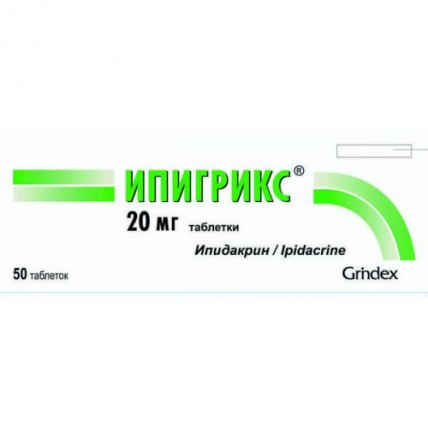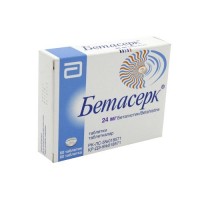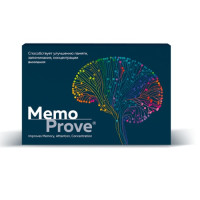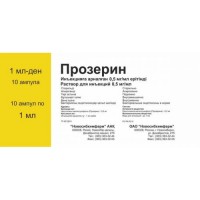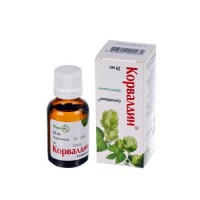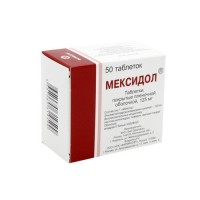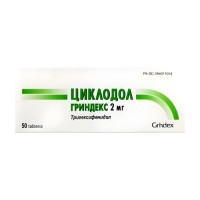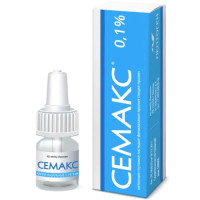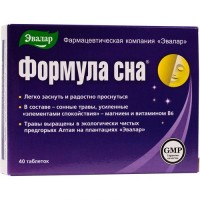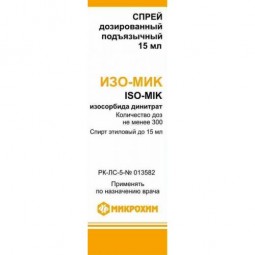IPIGRIX® 20 mg (50 tablets)
- $40.00
The instruction for medical use of Ipigrix Torgovoye medicine IPIGRIKS name the International unlicensed name Ipidakrin Lekarstvennaya a form of the Tablet of 20 mg Structure One tablet contains active agent: an ipidakrina a hydrochloride (in terms of anhydrous substance) – 20 mg, excipients: lactoses the monohydrate, potato starch, potato starch which is dried up calcium stearate. The description Round ploskotsilindrichesky tablets of white or almost white color with a facet. Pharmacotherapeutic group of Psikhoanaleptiki. Cholinesterase inhibitors. Ipidakrin. The ATX N06DA05 code the Pharmacological Pharmacokinetics Absorption At properties oral administration is quickly soaked up from digestive tract. Absorption mainly comes from a duodenum, to a lesser extent – from a small intestine. The maximum concentration of an ipidakrin in plasma after use of a dose of 10 mg is reached in 1 hour. Distribution of 40-55% of an ipidakrin contacts plasma proteins. Ipidakrin quickly comes to fabrics, and in plasma find in an equilibrium state only 2% of an ipidakrin. Metabolism is carried out in a liver. Removal is carried out renalno and ekstrarenalno, excretion with urine prevails. The half-cycle of removal makes 40 minutes. Excretion through kidneys with urine is carried out mainly by secretion in renal a tubule, and only 1/3 part of medicine are removed, being filtered in balls. After oral administration with urine in not changed look 3.7% of a dose, after parenteral use – 34.8% of a dose are removed. The pharmacodynamics Ipidakrin is reversible inhibitor of cholinesterase. Directly stimulates carrying out impulses in central nervous system and in neuromuscular synapses, blocking potassium channels of membranes. Ipidakrin strengthens action on smooth muscles not only acetylcholine mediator, but also adrenaline, serotonin, a histamine and oxytocin. Main pharmacological effects of an ipidakrin: - restoration and stimulation of neuromuscular carrying out, - restoration of carrying out an impulse in peripheral nervous system after the blockade caused by some factors (an injury, inflammation, effect of local anesthetics, antibiotics, chloride potassium, etc.), - strengthening of contractility of smooth muscle bodies under the influence of all agonists, except chloride potassium, - specific moderate stimulation of central nervous system in a combination with separate manifestations of sedative action, - memory improvement. Statistical data of clinical trials of safety of use for children are absent. Indications - diseases of peripheral nervous system (neuritis, a polyneuritis, polyneuropathy, a polyradiculoneuropathy, a myasthenia and a myasthenic syndrome of a different etiology) - bulbar paralyzes and paresis - the recovery period after the organic lesions of central nervous system which are followed by motive disturbances - complex treatment of demyelinating diseases - disturbances of memory of different origin (Alzheimer's disease and other forms of senile dementia) - an intestines atony apply the Route of administration and doses of the Tablet inside, washing down with water. Doses and duration of treatment define individually depending on disease severity. Adult Diseases of peripheral nervous system, myasthenia and myasthenic syndrome: apply 10-20 mg 1-3 times a day. Duration of a course of treatment is 1-2 months. If necessary the course of treatment can be repeated several times with a break between courses in 1‑2 months. Apply other dosage form (2 ml of the solution for injections containing 5 mg of an ipidakrin in 1 ml) to receiving a single dose of 10 mg. For prevention of development of myasthenic crisis at heavy disturbance of neuromuscular transfer: quickly parenterally enter 15-30 mg (1-2 ml of the solution for injections containing 15 mg of an ipidakrin in 1 ml). Treatment is continued by tablets, increasing a dose to 20-40 mg (1-2 tablets) of 5-6 times a day. The maximum daily dose can reach 240 mg (12 tablets in 6 receptions). Disturbances of memory of different origin (Alzheimer's disease and other forms of senile dementia): the maximum daily dose can reach 200 mg (10 tablets in 5 receptions). Duration of a course of treatment is 1-12 months. Intestines atony: the dose makes 20 mg 2-3 times a day within 1‑2 weeks. Elderly patients and patients with disturbances of activity of a liver and/or kidneys: selection of doses is not required. Children: safety of use to children and teenagers aged up to 18 years is not studied therefore use is contraindicated. Side effects good tolerance. The possible side effects connected with excitement of mkholinoretseptor can be shown not at all. At manifestation of side effects reduce a dose or quickly (for 1‑2 days) stop use. Further side effects are ordered according to the database of classification of systems of bodies MedDRA and division of frequency of occurrence: very often (≥1/10), it is frequent (≥1/100 to & lt, 1/10), infrequently (≥1/1000 to & lt, 1/100), is rare (≥1/10,000 to & lt, 1/1000), is very rare (& lt, 1/10,000), it is not known (it is impossible to determine by available data). From nervous system Infrequently: dizziness, a headache, drowsiness (at use of high doses). From heart it is frequent: heartbeat, bradikardiya*. From respiratory organs, a thorax and mediastinum Infrequently: the strengthened secretion of bronchial tubes. From digestive tract Often: salivation *, nausea. Infrequently: vomiting (at use of high doses). Seldom: a diarrhea, pain in epigastriums. From skin and hypodermic fabrics Often: the strengthened sweating. Infrequently: allergic reactions (an itching, rashes) (at use of high doses). From the skeletal and muscular and accompanying systems Infrequently: muscular spasms (at use of high doses). The general disturbances and reactions in the injection site Infrequently: weakness (at use of high doses). * Salivation and bradycardia can be reduced, applying holinoblokator (for example, atropine). Contraindications - hypersensitivity to any component of drug - epilepsy - extrapyramidal disturbances with a hyperkinesia - stenocardia - the profound bradycardia - bronchial asthma - impassability of intestines or urinary tract - exacerbation of stomach ulcer or a duodenum - vestibular disturbances - pregnancy and feeding by a breast - children's and teenage the age up to 18 years Medicinal interactions At simultaneous use with the drugs oppressing central nervous system enhances sedation. At use with other inhibitors of cholinesterase and mkholinomimetichesky means strengthens action and side effects. At simultaneous use with other cholinergic means for patients with a myasthenia the risk of cholinergic crisis amplifies. Beta blockers enhance severity of the bradycardia caused ipidakriny. Cerebrolysinum together with ipidakriny improves process of mental activity. Alcohol enhances side effects of an ipidakrin. Special instructions With care should be applied - to patients with stomach ulcer, a duodenum ulcer in the anamnesis, a thyrotoxicosis and serdechnososudisty diseases - to patients with a disease of airways and an acute disease of airways of the Tablet contain lactoses in the anamnesis monohydrate. This medicine should not be applied to patients with rare congenital intolerance of a galactose, deficit of Lapp of lactase or malabsorption of glucose galactose. Pregnancy and the period of a lactation Ipidakrin strengthens a tone of a uterus and can cause premature patrimonial activity therefore it cannot be applied during pregnancy. Ipidakrin mothers cannot apply during feeding of the child a breast due to the lack of data on safety of use. Features of influence of medicine on ability to run vehicles or potentially dangerous Ipidakrin mechanisms can have sedative effect therefore to the patients subject to this action, during use of an ipidakrin it is necessary to be careful at control of vehicles and work with mechanisms. Overdose Symptoms: at heavy overdose the cholinergic crisis (bronchospasm, dacryagogue, the strengthened sweating, miotic pupils of eyes, a nystagmus, spontaneous defecation and a mocheotdeleniye, vomiting, bradycardia, heart block, arrhythmia, hypotension, concern, feeling of alarm, excitement, sensation of fear, an ataxy, not clear speech, drowsiness, weakness, spasms and a coma) can develop. Symptoms can be expressed poorly. Symptomatic treatment: apply m-holinoblokatory (atropine, Cyclodolum, Methacinum, etc.). A form of release and packing On 25 tablets in blister strip packaging from aluminum foil and a film polyvinylchloride. On the 2nd blister strip packagings together with the instruction for medical use in the state and Russian languages place in a pack from cardboard. To Store storage conditions at a temperature not above 25 °C. To store out of children's reach! Not to apply a period of storage of 5 years after an expiration date! Prescription status According to the prescription JSC Grindex Producer. Krustpils St., 53, Riga, LV-1057, Latvia the Name and the country of the owner of the registration certificate of JSC Grindex, Latvia responsible for post-registration observation of safety of medicine Representative office of JSC Grindex 050010, Almaty, Dostyk Ave., a corner of Bogenbay St. of the batyr, 34a/87a, office No. 1
to Develop the Address of the organization accepting in the territory of the Republic of Kazakhstan claims from consumers on quality of medicines
to Develop the Address of the organization accepting in the territory of the Republic of Kazakhstan claims from consumers on quality of medicines
